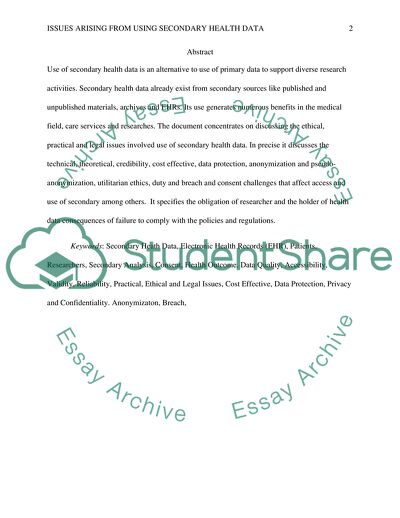
- Home
- Free Samples
- Premium Essays
- Editing Services
- Extra Tools
- Essay Writing Help
- About Us
- Studentshare
- Subjects
- Health Sciences & Medicine
- The Issues That Arise from Using Secondary Health Data in Research
The Issues That Arise from Using Secondary Health Data in - Research Paper Example

- Subject: Health Sciences & Medicine
- Type: Research Paper
- Level: Undergraduate
- Pages: 25 (6250 words)
- Downloads: 0
- Author: lrunolfsson
Extract of sample "The Issues That Arise from Using Secondary Health Data in"
The document concentrates on discussing the ethical, practical, and legal issues involved in the use of secondary health data. In precise it discusses the technical, theoretical, credibility, cost-effectiveness, data protection, anonymization and pseudo-anonymization, utilitarian ethics, duty, and breach, and consent challenges that affect access and use of secondary among others. It specifies the obligation of the researcher and the holder of health data consequences of failure to comply with the policies and regulations. Keywords: Secondary Heath Data, Electronic Health Records (EHR), Patients, Researchers, Secondary Analysis, Consent, Health Outcome, Data Quality, Accessibility, Validity, Reliability, Practical, Ethical and Legal Issues, Cost Effective, Data Protection, Privacy, and Confidentiality. Anonymization, Breach, Research in the field of medicine and health sciences continues to rely on accessible health data from varying sources to resolve existing problems.
Whether in private hospitals or for public health, researchers explore varying depths into the patients’ records, diverse public reports, and even interviews with patients or concerned parties (like staff and insurance covers) just to obtain the data. Data collection is of great importance in health issues to assist provide a clear reflection of how organizations best offer care to the patients, explain the cause-and-effect relationship of specific problems, use scarce resources appropriately and support overall management.
This introduces the divergence in primary and secondary health data obtained for research. According to Boslaugh, secondary data is the data set in question collected by the researcher analyzing the findings from primary research where he has no connections with its research design or original data collection (n.d, p.1). Secondary data entails the use of existing data while primary data entails researchers’ collection of data for specific structured research questions for the intended purpose of the study (Andrews et al, 2012).
Secondary health data for research can be found in published and nonpublished sources entailing health-related journals and books, hospitals, and healthcare-related records/databases, government archives, and internet sources among others (Curtis, n.d).
...Download file to see next pages Read MoreCHECK THESE SAMPLES OF The Issues That Arise from Using Secondary Health Data in Research
Social Work Intervention in Mental Health Issues
Introduction of Thesis Dignity in Elderly Care
Capital Structure and Performance of UK Financial Institutions
Secondary Quantitative Data
Causes of Childhood Obesity
Methodological Issues in Interviewing
Sources and Resolving of Heath Care Conflicts
Qualitative Research and Its Analysis

- TERMS & CONDITIONS
- PRIVACY POLICY
- COOKIES POLICY